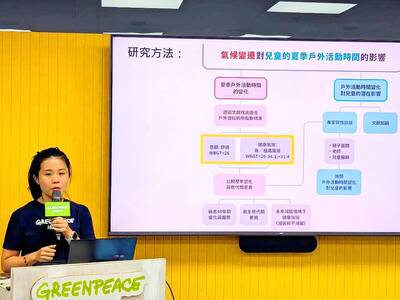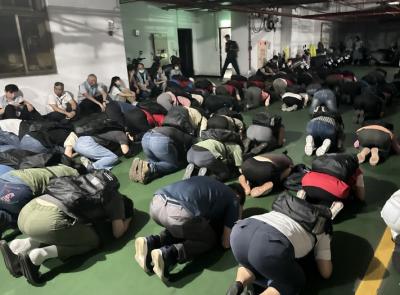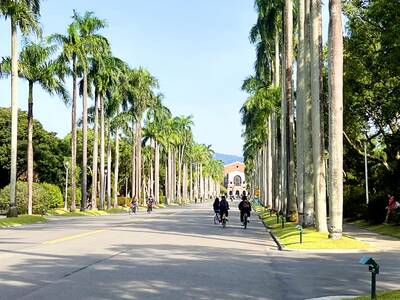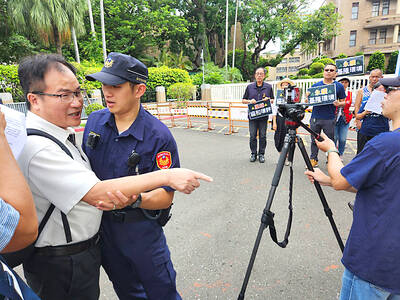Two advocates of Lifestyles of Health and Sustainability (LOHAS) from Japan attended a conference in Taipei yesterday to share their experience in creating a community based on LOHAS principles.
“With its goals to achieve a healthy mind and body, a healthy community and a healthy earth, LOHAS is the answer to many of the problems facing modern society,” said Owada Junko, a co-founder of the LOHAS Business Alliance.
She said that serious issues were facing Japanese society, including overwork and the inefficiency of employees, an over-dependency on oil and decreasing domestic food and wood supplies.
“I encourage all to live a more relaxed lifestyle,” Owada said. “On your days off, take a trip to the countryside, travel slowly, interact with locals and learn something new, immerse yourself in the environment so that your body and mind get fully rested.”
“Cut the carbon emissions in your life — ride bicycles, drive hybrid cars, ride with your friends or neighbors to work,” Owada said.
As for governments, Owada said they should “promote green buildings and build light rail systems.”
The most important job for the alliance is to promote doing business the LOHAS way, Owada said.
“Businesses should share some of the responsibility in creating a LOHAS society,” she said. “You must know where your goods come from.”
For example, businesses may contribute by selling locally sourced, organic and fair-trade products or other environmentally-friendly items, Owada said.
Nishimura Toshiyuki, a representative from the Jiyugaoka Association for Business and Commerce, recounted how the Jiyugaoka community in Tokyo turned itself into a model LOHAS community in just 10 years.
“Rather than waiting for the government to do it, the power of the community was more reliable,” Nishimura said.
Jiyugaoka is a small Tokyo community outside the busy commercial districts known for its traditional and creative small shops.
“One of the first problems our community ran into was garbage collection,” Nishimura said.
Normally, garbage trucks from the Tokyo municipal government would only collect garbage in the morning.
“That meant we had to put out the garbage the night before,” he said. “But this created problems.”
After fruitless negotiations with the government, the community decided to hire a private company to collect the trash at night.
“In order to raise the funds for the garbage service, we designed our own Jiyugaoka garbage bags and sold them via vending machines in the community,” he said.
However, it took the organization more than a year to convince the more than 1,000 households in Jiyugaoka before it became a reality.
Another thing that Nishimura is proud of is the Jiyugaoka shuttle bus that runs on recycled food oil.
“Since Jiyugaoka is far from the metropolitan center, we decided to have a shuttle bus running to the nearest train station — and have the bus run on recycled food oil to reduce pollution,” he said.
“The transportation authority said that we had to have a registered company to run the shuttle service and that the bus could not run on recycled food oil,” Nishimura said.
The community eventually found a company that was willing to sponsor their bus and the bus runs on food oil despite the ban.
“It’s quite ironic that the Ministry of the Environment have presented awards to Jiyugaoka for our eco-friendly bus, while the Ministry of Land, Infrastructure and Transport still does not allow it,” Nishimura told the audience.

The government should improve children’s outdoor spaces and accelerate carbon reduction programs, as the risk of heat-related injury due to high summer temperatures rises each year, Greenpeace told a news conference yesterday. Greenpeace examined summer temperatures in Taipei, New Taipei City, Taoyuan, Hsinchu City, Taichung, Tainan and Kaohsiung to determine the effects of high temperatures and climate change on children’s outdoor activities, citing data garnered by China Medical University, which defines a wet-bulb globe temperature (WBGT) of 29°C or higher as posing the risk of heat-related injury. According to the Central Weather Administration, WBGT, commonly referred to as the heat index, estimates

Taipei and other northern cities are to host air-raid drills from 1:30pm to 2pm tomorrow as part of urban resilience drills held alongside the Han Kuang exercises, Taiwan’s largest annual military exercises. Taipei, New Taipei City, Keelung, Taoyuan, Yilan County, Hsinchu City and Hsinchu County are to hold the annual Wanan air defense exercise tomorrow, following similar drills held in central and southern Taiwan yesterday and today respectively. The Taipei Mass Rapid Transit (MRT) and Maokong Gondola are to run as usual, although stations and passenger parking lots would have an “entry only, no exit” policy once air raid sirens sound, Taipei

Taipei placed 14th in the Quacquarelli Symonds (QS) Best Student Cities 2026 list, its highest ever, according to results released yesterday. With an overall score of 89.1, the city climbed 12 places from the previous year, surpassing its previous best ranking of 17th in 2019. Taipei is “one of Asia’s leading higher-education hubs,” with strong employer activity scores and students “enjoying their experience of the city and often keen to stay after graduation,” a QS staff writer said. In addition to Taipei, Hsinchu (71st), Tainan (92nd), Taichung (113th) and Taoyuan (130th) also made QS’ list of the top 150 student cities. Hsinchu showed the

Environmental groups yesterday filed an appeal with the Executive Yuan, seeking to revoke the environmental impact assessment (EIA) conditionally approved in February for the Hsieh-ho Power Plant’s planned fourth liquefied natural gas (LNG) receiving station off the coast of Keelung. The appeal was filed jointly by the Protect Waimushan Seashore Action Group, the Wild at Heart Legal Defense Association and the Keelung City Taiwan Head Cultural Association, which together held a news conference outside the Executive Yuan in Taipei. Explaining the reasons for the appeal, Wang Hsing-chih (王醒之) of the Protect Waimushan Seashore Action Group said that the EIA failed to address